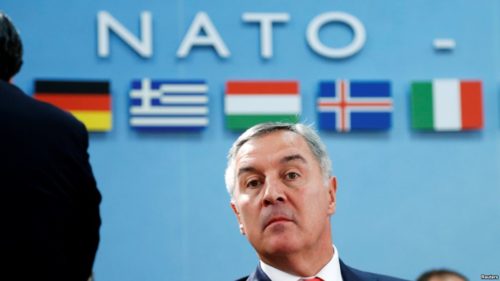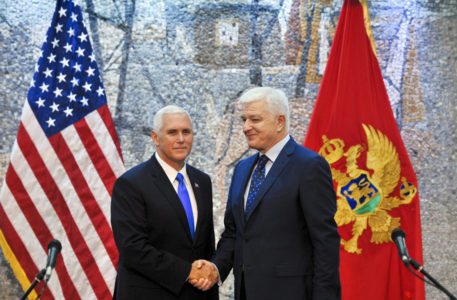The Russians are coming
How the EU reactivated its EU enlargement policy

Montenegrin President Milo Djukanovic (RFE/RL)
Recently, I stumbled upon a friend I have not seen in ages. We met at one summer school some time ago. I will not say the exact date, as it shocks me how time flies. In our conversation, we recalled the times of our International Politics class, where main discussions were focussed on different topics than nowadays. In the pre-Crimea annexation times, we were being happy that former US President Barack Obama was having a hamburger in some classic US burger joint with then-Russian President Medvedev. The biggest threat was still Al-Qaeda, while Donald Trump was just considered as an eccentric businessman-turned reality show star.
Needless to say, many things have changed since then. Hamburger times have passed, and UN Secretary General Antonio Guterres has suggested that the USA and Russia should reactivate the red phone from the Cold War days. Geopolitical games are not only restricted to these two players, but one could also witness the increased influence of Turkey, ranging from Turkish soap operas to development agencies, as well as several Gulf countries. The giant from the East, China, is spreading its influence through initiatives like the One Belt One road one, as well as excessively investing in infrastructural projects around the globe.
However, this time I will just focus on Russia and its influence in the Western Balkans, in light of the reactivation of the EU enlargement policy, which was fostered as a direct response to assertive actions in the region. Coincidentally, the European Union has published its annual EU enlargement package, which was on Monday presented by Commissioner Johannes Hahn to MEPs in the European Parliament. Around the time I am writing this text, Council President Donald Tusk is touring the Western Balkans, continuing where Commission President Jean-Claude Juncker started in February. The grand finale is expected next month at a special summit dedicated to EU – Western Balkans in Sofia, under the auspices of enlargement-friendly Bulgaria, currently presiding the EU.
At the same time, Russia has massively increased its presence on the Western Balkans in the past couple of years. Opening up various humanitarian centres, Russia-friendly societies and the Kremlin-funded media on Serbian language. Through its media sources, which purposely spread (as free content) their fake news and attacks on the EU, NATO and liberal forces, Kremlin has been using the disinformation war to spread fear, hatred and lies. These are all very well-known facts to everyone, but this week’s incident in the BiH Parliament brought a new type of involvement, this time, as direct as it can be.

US Vice President Mike Pence (L) shakes hands with Montenegro’s Prime Minister Dusko Markovic (R) prior to their joint press conference in Podgorica on August 2, 2017. (SAVO PRELEVIC/AFP/Getty Images)
Valentina Matviyenko, one of the most important Putin-backed politicians and speaker of the Russian Parliament’s upper house, visited Sarajevo and gave a fiercely speech attacking NATO and the EU, which resulted in protests from everyone except the pro-Putin politicians from the entity of Republic of Srpska, led by their President Milorad Dodik, who is under US sanctions. This open flirt with Russia is less visible in Serbia, where even the aforementioned Donald Tusk views the current leader as a pragmatist, despite failing to align with the EU CFSP, rejecting to oppose sanctions to Russia. In Macedonia the stakes look very clear now, with the pro-EU and pro-NATO government trying to fix the mess from the previous right-wing Orbanesque government, while Montenegro has already joined NATO, despite Russian wishes, and is the most advanced in EU negotiations. Albania and Kosovo are probably the most anti-Russian countries in Europe.
To conclude, it is encouraging that Donald Tusk is giving out statements that there is readiness to continue the work on the EU perspective of the Western Balkans, and that Commission President Jean-Claude Juncker is stressing the need for the EU perspective for the Western Balkans, in order to avoid potential conflicts. People change throughout the years and it is definitely not the same Commission President who cold-heartedly, in a bureaucratic style, stated in his inauguration speech that there will be no EU enlargement in his mandate. Despite surveys showing that people in the Western Balkans are not aware of it, the EU remains the largest trade partner and the investor in the region. Also, the recent Commission recommendation to open negotiations with Albania and Macedonia raised some optimism. Things are progressing in small steps, optimism is here, and hopefully will stay. Otherwise, there will be more than one actor happy to destabilize the Balkan countries on their EU path.
